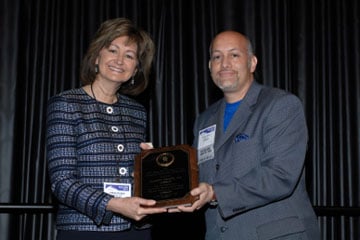 Dr. Allison Kempe won the 2011 Academic Pediatric Association's Research Award, which recognized the highest level of research excellence and achievement in the field of general pediatrics.
Dr. Allison Kempe won the 2011 Academic Pediatric Association's Research Award, which recognized the highest level of research excellence and achievement in the field of general pediatrics.
In just its first year, the Center for Research in Implementation Science and Prevention (CRISP) has become known for its multidisciplinary research that links primary care, public health and community prevention efforts.
The center also broadly disseminates research findings and provides education and training in implementation science.
Following is a Q & A with CRISP Director Allison Kempe, MD, MPH, about the work being done at CRISP and the educational resources that can be found on the center's website.
Q: What is the central mission of CRISP?
Dr. Kempe: There is a big gap between what we could accomplish in the area of prevention and what we are currently accomplishing in primary care practice in this country. Preventive services that work are not reaching many people who need them. Our mission is to advance the understanding of how to get preventive services that have been shown to be effective to be widely implemented. Simply put, to learn how to get the right preventive services to people who need them at the time they need them.
Q: How does CRISP promote multidisciplinary approaches to public health and prevention?
Dr. Kempe: All 3 CRISP research projects have interventions that rely on linkages between primary care, public health and the community to deliver prevention efforts to the public.
- The overall goal of the Immunization Reminder/Recall Project (PI: Allison Kempe) is to increase the percentage of children who are up-to-date for childhood immunizations before they reach kindergarten. It compares the effectiveness and cost effectiveness of two approaches to accomplishing this, one of which relies on public-private collaboration between State and county public health departments and primary care practices in multiple counties.
- The cardiovascular screening project (PI: Jack Westfall) uses a bi-directional text messaging intervention integrated with a web-based Cardiovascular Prevention Registry to improve participation in a statewide community cardiovascular screening and navigation program aimed at decreasing cardiovascular disease.
- The obesity prevention project (PI: Art Davidson) uses bi-directional text messaging and community-based patient navigators to change behaviors contributing to obesity in childhood.
Q: What are some of CRISP's milestone achievements during its existence?
Dr. Kempe: CRISP is still in its first year, so many of our research and educational efforts are in their infancy
- Our website went live over the summer. It is a resource center that includes recorded seminars from our CRISP seminar series, information on the CRISP research projects, and web links to other educational learning opportunities. We will be using this site to feature upcoming toolkits, whitepapers and other resources related to implementation science.
- We launched the monthly CRISP Seminar Series: Insights and Innovation in Improving Health. Topics correspond with our 4 educational domains in implementation science:
- Theory and strategies
- Community and stakeholder engagement
- Tools and approaches
- Evaluation: design and analysis
- The three CRISP projects are underway and in their first year, with results expected by Fall 2013.
- We have presented preliminary data to both national (AHRQ Conference, Washington, D.C.) and regional (Engaging Communities in Education and Research, Vail, CO) audiences
Q: How does CRISP fit into the National Prevention Strategy?
Dr. Kempe: The National Prevention Strategy’s overarching goal is to increase the number of Americans who are healthy at every stage of life. To achieve this goal the NPS has 4 strategic directions, one of which is Clinical and Community Preventive Services, the goal with which CRISP is most closely aligned. This strategy ensures that prevention-focused health care and community prevention efforts are available, integrated and mutually reinforcing. CRISP incorporates several of the recommendations to advance this strategic direction, including a focus on improving cardiovascular health and expanding the use of health information technology.
Q: What is something(s) about CRISP that isn't widely known, but should?
Dr. Kempe: CRISP is focused on understanding how to make interventions that have been proven effective in studies that are often conducted in artificial settings, work in “real-world” settings. Because the majority of successful research is never implemented, our Center fills a critical niche.
Q: The Agency for Healthcare Research and Quality funded three new Centers for Excellence in Implementation of Preventative Services in 2012, one of which was awarded to the university's researchers. Why do you think this is so?
Dr. Kempe: The task of the three Centers for Excellence is to serve as national resources in 3 areas of clinical preventive services: health equity, patient safety and health care implementation. The University of Colorado was selected as the Center for Excellence in Health Care Implementation because we have national leaders in the area of implementation in primary care settings and a long history of conducting health services and outcomes research at the Colorado Health Outcomes Program (COHO) and the Children’s Outcomes Research Program (COR). The University also has an extensive network of well-established practice-based research networks to serve as laboratories for better understanding implementation and national authorities in the area of innovative health information technology to facilitate implementation in primary care settings.
Q: What is something you'd like folks to know about the CRISP website?
Dr. Kempe: The CRISP website is an excellent educational resource. The 2012/2013 schedule for the seminar series is available and we will also provide archived slides and video from our series. There is also a page for other learning opportunities in implementation science that includes upcoming webinars and trainings offered by a variety of organizations and universities.
Our goal is to make this website a customer-focused resource center that provides useful materials to help advance knowledge of implementation science and disseminate evidence-based research. We update our site frequently and will soon have additional resources such as bibliographies, toolkits and white papers.
